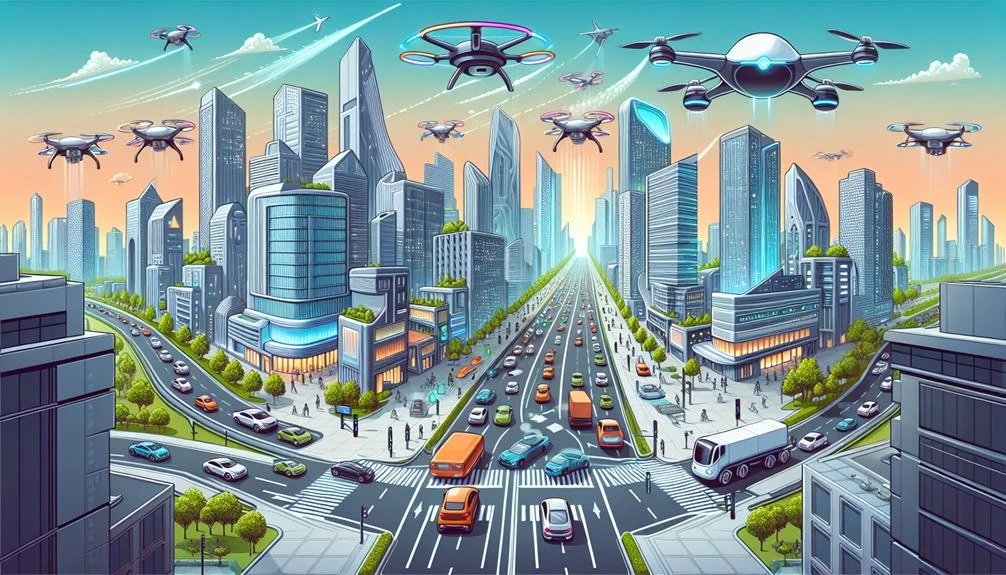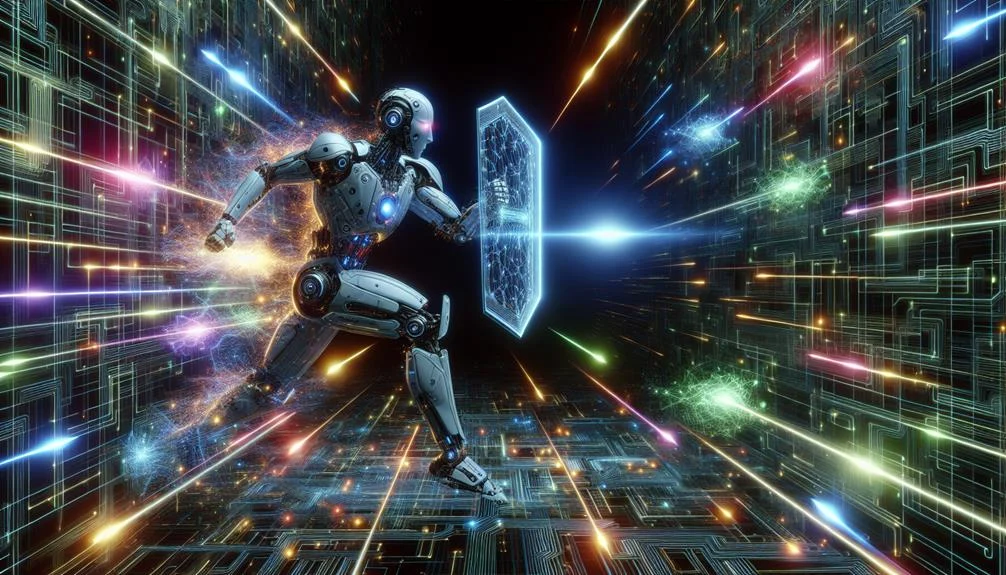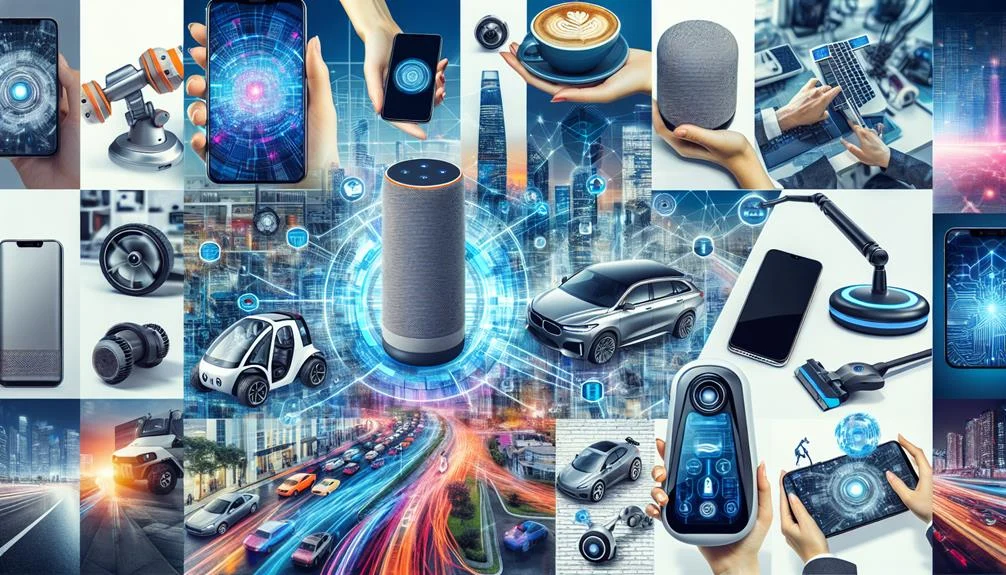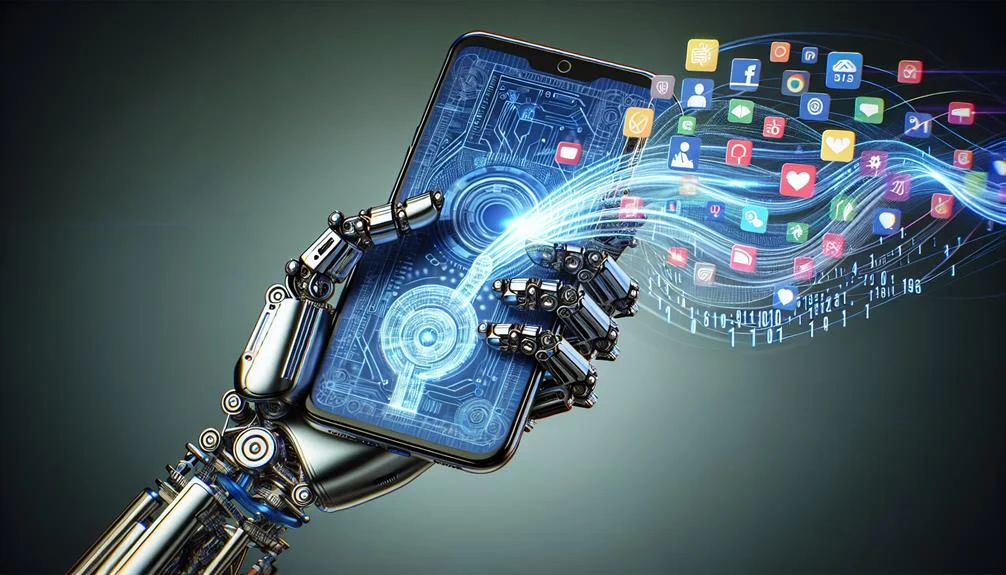Artificial Intelligence used in everyday life effectively permeates numerous aspects of our daily life. It customizes user experiences through personalized recommendations in online shopping and entertainment platforms. It transforms healthcare with enhanced diagnosis, treatment, and proactive patient monitoring. In transportation, AI promotes safety and efficiency. It strengthens cybersecurity by preventing fraud and protecting privacy. AI algorithms filter social media feeds and detect disinformation. By exploring this topic, you’ll uncover the ways in which AI is not only driving innovation in these and other sectors today, but also shaping projections for the technology’s use in the near future.
Main Points
- AI personalizes user experiences by managing calendars and providing tailored product recommendations in online shopping.
- In healthcare, AI assists in accurate diagnoses, treatment plans, and patient monitoring for better outcomes.
- AI enhances entertainment through personalized content suggestions and the creation of lifelike characters in games.
- AI improves transportation safety and efficiency with autonomous vehicles and smart traffic management systems.
- AI safeguards digital interactions by detecting cybersecurity threats, filtering fake news, and personalizing social media feeds.
Understanding Artificial Intelligence
To fully comprehend the breadth and scope of Artificial Intelligence (AI), one must consider its pervasive role in daily tasks such as calendar management, online personalization, communication, and even creative endeavours. AI, through machine learning algorithms, can predict, learn and adapt to the user’s behavior. This facilitates a seamless and personalized user experience. For instance, AI can manage and organize calendars, set reminders, and compile to-do lists, thereby improving productivity and efficiency.
In online personalization, AI technologies are utilized to analyze user preferences and behavior. Machine learning algorithms sift through vast amounts of data to recommend movies, products, and services tailored to the user’s tastes. In communication, AI, with the aid of Natural Language Processing (NLP), categorizes emails, provides instant customer support through chatbots, and bridges language gaps with translation tools.
AI has ventured into the sphere of creativity, revolutionizing photo editing and music composition, and even acting as a collaborative partner in creative pursuits. These innovations exemplify the versatility and potential of AI, ultimately enhancing the quality of daily life.
Artificial Intelligence Used in Everyday Life: Healthcare Industry

In the healthcare industry, artificial intelligence has been instrumental in transforming conventional diagnostic and treatment methods while improving patient outcomes by optimising processes and workflows. By leveraging machine learning algorithms, AI applications can analyze vast amounts of data, thereby enabling accurate diagnoses and treatments. This ability to process and interpret data is important in modern medicine, where timely and accurate decisions can greatly impact patient recovery and survival rates.
Artificial intelligence also plays a pivotal role in real-time patient monitoring. By continuously tracking patient conditions, AI can alert healthcare providers of critical changes, enabling prompt intervention.
Here are some notable ways AI is reshaping the healthcare industry:
- Accurate Diagnoses and Treatments: AI can analyze medical images, detect anomalies, and suggest potential treatment strategies.
- Real-time Patient Monitoring: AI technologies can monitor patient’s vitals round the clock, ensuring timely interventions.
- Development of Personalized Treatments: AI can analyze patient’s genetic information and lifestyle factors to develop personalized treatment plans.
Artificial Intelligence Used in Everyday Life: Entertainment

Shifting our focus to entertainment, it becomes apparent that artificial intelligence significantly improves user experiences, from customizing content suggestions on streaming platforms to enhancing the realism and challenges in gaming. This is mainly due to AI algorithms that serve as the backbone of many entertainment services.
AI-fueled recommendation algorithms have transformed the way viewers interact with streaming services like Netflix. Based on user behavior, these algorithms curate a personalized content list, thereby boosting viewer satisfaction and user engagement. This is an example of how AI tailors the entertainment experience to individual preferences, making it more immersive and enjoyable.
Artificial intelligence also plays a significant role in gaming platforms, creating lifelike characters and gameplay challenges that captivate players. Advanced AI algorithms can analyze in-game player behavior and adjust opponents’ difficulty level or tactics accordingly. This dynamic adjustment enhances the gaming experience, making it more engaging and challenging.
Similarly, music streaming services utilize AI to craft personalized playlists, enhancing user engagement and satisfaction. AI’s ability to identify trends and optimize content ensures that entertainment platforms can deliver personalized experiences that resonate with each user. Hence, AI has become indispensable in shaping the entertainment industry.
Artificial Intelligence Used in Everyday Life: Transportation Innovations

In transportation, artificial intelligence is pioneering revolutionary changes, with autonomous vehicles and intelligent traffic management systems leading the way towards enhanced safety and efficiency. These AI-driven innovations are transforming the transportation landscape, creating an ecosystem that is safer, more efficient, and environmentally friendly.
AI-powered autonomous vehicles are reshaping the way we commute. These vehicles leverage sophisticated machine learning algorithms to navigate traffic, avoid obstacles, and make safe driving decisions. This not only enhances commuter safety but also markedly reduces travel times.
Intelligent traffic management systems, on the other hand, utilize AI to optimize traffic flow. They analyze real-time data to manage traffic lights and control traffic patterns, thereby reducing congestion and improving overall transportation efficiency.
AI technology suggests the best routes for commuting. By analyzing traffic patterns and conditions, AI can tell the quickest and most efficient routes, saving commuters valuable time and reducing the environmental impact of transportation.
In summary, AI is driving significant innovations in transportation, including:
- Autonomous vehicles for enhanced safety and efficiency
- Smart traffic management systems for optimized traffic flow
- AI-suggested best routes for reduced travel time and congestion
These advancements are marking a new era in transportation, where AI plays a pivotal role in enhancing safety and efficiency.
Artificial Intelligence Used in Everyday Life: Cybersecurity

Artificial Intelligence (AI) is transforming the landscape of cybersecurity. It plays a pivotal role in detecting security breaches, preventing fraudulent activities, and enhancing privacy protection. AI promptly identifies anomalies that could signify a potential security threat by analysing patterns and behaviours in real-time.
Utilizing AI in fraud prevention and privacy protection not only fortifies security measures but also adapts to the constantly evolving landscape of cybersecurity threats.
Detecting Security Breaches
Cybersecurity’s shield against potential threats has been greatly strengthened with the integration of artificial intelligence, which plays a vital role in detecting and preventing security breaches. AI tools are designed to analyze real-time traffic, identifying and blocking irregularities that may signal a potential threat.
In addition, AI has been instrumental in:
- Monitoring social media platforms for fake news, helping in the early detection and prevention of misinformation and phishing attacks.
- Enhancing customer service by streamlining identity verification processes, thereby reducing the risk of unauthorized access.
- Utilizing facial recognition technology for user authentication, adding an extra layer of security against breaches.
AI’s role in cybersecurity signifies a revolution in protecting and safeguarding data against diverse cyber threats.
AI in Fraud Prevention
Harnessing the power of complex algorithms, artificial intelligence has emerged as a formidable tool in combating cyber fraud. Its capacity to detect and thwart illicit activities in real-time is unparalleled. Machine learning algorithms analyze data patterns, thereby identifying potential indicators of fraud. This proactive approach greatly enhances cybersecurity measures.
By continuously monitoring user behavior, transactions, and network activities, AI can detect suspicious patterns that may indicate fraudulent activities. This technology particularly benefits financial institutions and e-commerce platforms, offering robust security against potential fraud attempts.
The use of AI in fraud prevention has reduced financial losses and improved overall security in online transactions, underlining its indispensable role in today’s digital age.
Enhancing Privacy Protection
In the increasingly digitized world, the role of Artificial Intelligence in bolstering privacy protection cannot be overstated, as it plays a pivotal role in detecting and mitigating cyber threats in real time.
- AI enriches cybersecurity measures by scrutinizing network traffic, promptly identifying and blocking potential security threats.
- Artificial Intelligence aids in curbing the spread of fake news, monitoring social media platforms and immediately spotting dubious information.
- Utilizing AI-powered facial recognition technology, authentication methods become more secure, enhancing privacy protection.
These advancements underscore AI’s instrumental role in fortifying cybersecurity, ensuring an elevated level of privacy protection. As technology evolves, AI’s role in safeguarding online spaces will only become more significant, making daily digital interactions safer and more trustworthy.
Artificial Intelligence Used in Everyday Life: Daily Life Enhancements

A remarkable proliferation of artificial intelligence in our daily routines has resulted in the optimization of tasks and processes, thereby enhancing our experiences with technology. Significantly, online shopping platforms utilize AI-driven predictive analytics to personalize product recommendations, improving overall user satisfaction. In tandem with social media, this AI-based personalisation creates a robust ecosystem that seamlessly integrates with our daily activities.
The impact of AI on our daily lives is also evident in healthcare, where AI-driven diagnostics and treatments improve patient outcomes. In this sector, AI algorithms can analyze vast data sets to identify patterns, leading to more accurate diagnoses and personalized treatment plans.
AI advancements drive innovation across various industries, transforming daily lives. For instance, intelligent technologies enabled by AI, such as home automation systems, have revolutionized our interaction with our surroundings. These innovations are not only enhancing our daily experiences but also catalyzing further technological breakthroughs.
AIs Influence on Social Media

The profound influence of artificial intelligence on social media dynamics is reshaping our digital interactions. AI offers a more personalized, secure, and engaging user experience. AI’s integration is subtle yet impactful, creating an ecosystem tailored to each user’s preferences and guaranteeing online safety. The impact of AI is far-reaching, from personalized recommendations based on user preferences to the prevention of cyberbullying.
AI’s influence is evident in:
- Recommendation Algorithms: AI dramatically enhances user experience by personalizing social media feeds. User behavior, likes, shares, and search history are examined to determine preferences, subsequently driving content that aligns with these preferences.
- Friend Suggestions: AI algorithms explore shared interests, mutual friends, and geographical location to suggest potential connections, fostering an interconnected digital community.
- Fake News and Cyberbullying: AI aids in identifying and filtering out fake news, while machine learning algorithms prevent cyberbullying by identifying and reporting offensive content.
Streaming services also utilize AI algorithms for personalized recommendations, ensuring users find content that aligns with their tastes. In social media, AI serves as an invaluable tool, enhancing user engagement and promoting safe digital interactions.
Future Predictions of Artificial Intelligence Used in Everyday Life

As we look towards the future of artificial intelligence, experts forecast a substantial increase in AI utilization across diverse sectors, further permeating daily tasks and systems.
From enhancing user experiences with personalized suggestions to streamlining various facets of everyday life, AI’s potential is vast and promising.
This future encompasses notable improvements in healthcare, transportation, entertainment, and cybersecurity, all powered by AI,revolutionizing technology and igniting innovation.
Advancements in AI Technology
Predictions of AI’s future role in society underscore its potential to revolutionize sectors ranging from healthcare and transportation to entertainment and cybersecurity, enhancing user experiences while driving unprecedented innovation. The advancements in AI technology are expected to transform our daily routines and our approach to complex challenges.
In healthcare, AI can lead to disease detection and treatment breakthroughs, making healthcare more personalized and proactive.
In transportation, AI advancements may bring about fully autonomous vehicles, increasing safety and efficiency.
In cybersecurity, AI can help identify and neutralize threats before they can cause harm, bolstering our defences against increasingly sophisticated cyber-attacks.
These developments, while remarkable, also necessitate a careful balance of benefits and potential risks, highlighting the importance of ethical considerations in AI development.
Impact on Daily Living
Harnessing the power of artificial intelligence, our daily living is predicted to be transformed, optimizing tasks and processes for enhanced efficiency and improved user experiences. Using artificial intelligence will enable personalized recommendations and tailored services, revolutionizing the healthcare, transportation, and entertainment sectors.
Integrating AI into daily routines is anticipated to drive innovation across industries, redefining our interaction with technology. From smart homes to self-driving cars, the future holds immense possibilities. Daily reliance on AI-driven technologies is expected to increase, with personalized innovative solutions becoming the norm.
Experts predict a significant shift in daily living, with AI at the forefront of this transformation. As a result, the impact of artificial intelligence on our daily lives is likely to be profound and all-encompassing.
Conclusion
Artificial Intelligence is intricately woven into the fabric of our daily lives, driving significant transformations across various sectors. AI’s profound influence is evident from healthcare to entertainment, transportation to cybersecurity, and even our social media interactions.
As we look towards the future, we can only anticipate an even greater integration of AI into our everyday activities. AI promises increased efficiency, improved accuracy, and a more personalized user experience. Hence, understanding and harnessing AI’s potential is imperative for our digital age.





